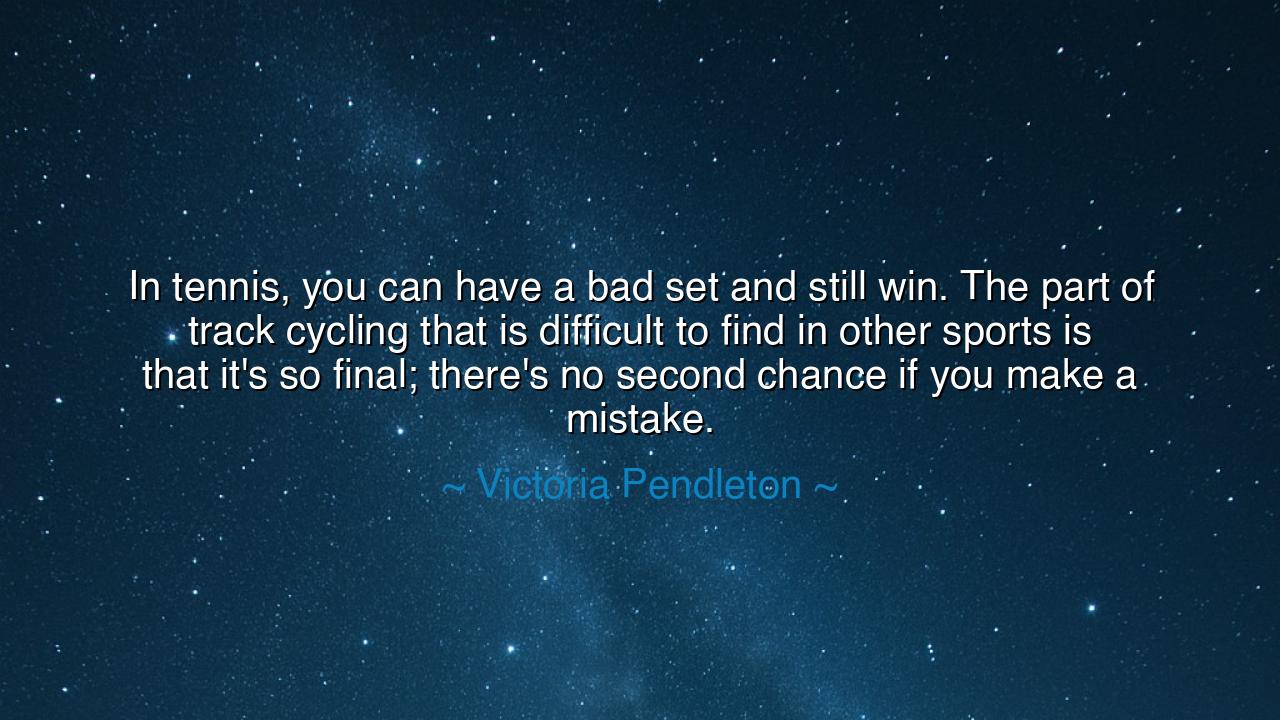
In tennis, you can have a bad set and still win. The part of
In tennis, you can have a bad set and still win. The part of track cycling that is difficult to find in other sports is that it's so final; there's no second chance if you make a mistake.






"In tennis, you can have a bad set and still win. The part of track cycling that is difficult to find in other sports is that it's so final; there's no second chance if you make a mistake." These words from Victoria Pendleton speak to the nature of competition and the unique pressures that come with track cycling. Pendleton contrasts tennis, where the game allows for recovery from mistakes, with track cycling, where a single error can spell defeat. The finality of cycling, the lack of second chances, carries a weight of intensity and urgency that can be both empowering and overwhelming. In this, Pendleton highlights the human experience of facing life’s most crucial moments—where decisions are irreversible, and the consequences of action or inaction are immediate and profound.
The idea of finality in sports, and in life, is a theme that resonates throughout ancient wisdom. In Greek philosophy, Heraclitus spoke of the flux of life—how everything is in constant change, and nothing is permanent. But he also acknowledged that within this constant change, there are moments of decisive action that leave us no room to retreat. Just as in track cycling, there are moments in life where we must act decisively, knowing that mistakes or delays cannot be undone. This idea finds an echo in Plato’s concept of the "moment of choice"—when the individual must act according to virtue, without second-guessing or retreating. The finality of these moments is not to be feared, but embraced as the opportunity to shape our destiny.
In the realm of ancient warfare, the same finality can be found. Consider the battle of Thermopylae, where the Spartan warriors stood against overwhelming odds. The choice to fight was final—there would be no retreat, no second chance. The famous King Leonidas led his 300 warriors with the understanding that their fate was sealed, but they would make their stand with honor and resolve. There was no possibility of a second chance, only the courage to act with the knowledge that their actions, though seemingly futile in the face of vast numbers, would define their legacy forever. Like Pendleton’s track cycling, their finality was a defining characteristic of the courage required to make each moment matter.
The nature of track cycling, where mistakes are irreversible, mirrors the immediacy found in the martial tradition of samurai warriors. The samurai were trained to respond to moments of conflict with speed and precision, knowing that a single misstep in combat could result in their death or dishonor. Their training was centered on mental discipline, focusing on the ability to respond decisively and with perfect technique. In the same way, Pendleton’s sport demands that each movement be deliberate, each decision weighted with the knowledge that there is no room for error once the race begins. This requires not just physical skill, but a profound mental fortitude, a complete acceptance of the finality of each moment.
Similarly, the journey of Alexander the Great exemplifies this tension between opportunity and finality. When Alexander led his troops into battle, he understood that there was no going back—each campaign was a step further into the unknown, and every decision made had the potential to alter the course of history. Alexander's boldness in the face of such final decisions was central to his success. Like Pendleton on the track, Alexander’s choices were often irreversible, and his legacy depended on ruthlessly embracing the moment without hesitation or fear of failure. In this, he understood that the power of his victories lay not in the opportunities for retreat, but in the courage to face the finality of each action.
The lesson in Pendleton’s words is that life, like track cycling, is filled with decisive moments that demand our full commitment. There are instances in our lives where we cannot afford to hesitate, where each decision carries the weight of permanent consequences. It is easy to fall into the trap of thinking that we have endless chances to change our paths, but sometimes the choices we make cannot be undone. Pendleton’s reflection is a reminder that opportunity often comes with finality, and it is our response in these moments that defines our success. Like the ancient warriors, the great leaders, and the athletes who must rise to the occasion, we must train ourselves to act decisively, knowing that sometimes, there is no turning back.
In practical terms, this means that we must embrace the present with focus and clarity. When faced with significant decisions, whether in career, relationships, or personal growth, we must trust our instincts and act with confidence, knowing that the consequences of our actions will shape our lives forever. Like Pendleton, we must develop the discipline to act without hesitation, fully aware that there may not always be a second chance. This requires mental training—the ability to perform under pressure and to make decisions that align with our highest values. In doing so, we prepare ourselves not just for success, but for the honor of facing life’s most crucial moments with the courage to take the right action, even when the stakes are high.






AAdministratorAdministrator
Welcome, honored guests. Please leave a comment, we will respond soon